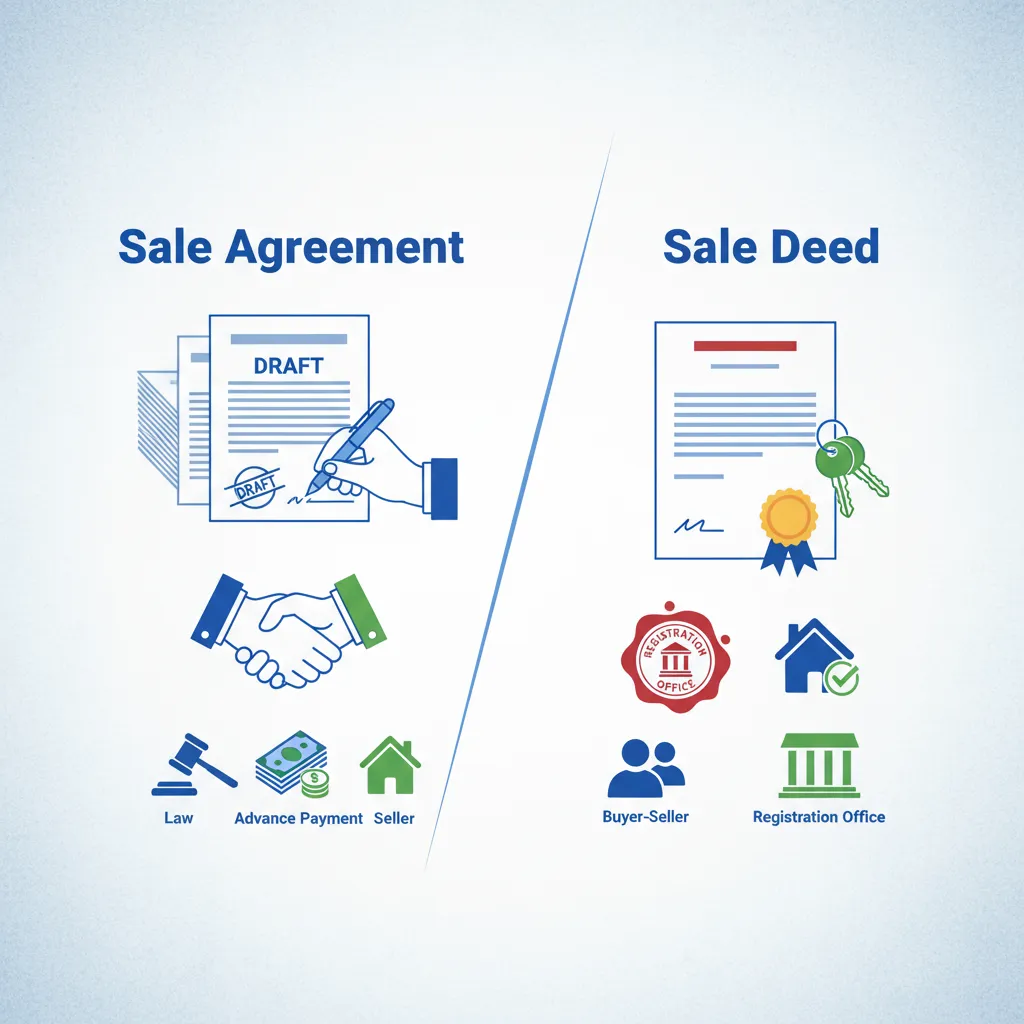

A Sale Agreement is a legally binding contract between a buyer and seller that outlines the terms of a future transfer of the property. Under the Transfer of Property Act, 1882, it establishes an enforceable obligation but does not confer ownership rights.
Key Features:
If either party fails to honour the terms, the other can enforce the agreement or seek damages under the Specific Relief Act, 1963.
A Sale Deed (or Conveyance Deed) is the final legal instrument that transfers actual ownership of the property. Only after registration under the Indian Registration Act, 1908 does legal title pass to the buyer.

Key Elements:
| Criteria | Agreement to Sell (Agreement) | Sale Deed |
|---|---|---|
| Purpose | Promise to transfer ownership later | Actual transfer of ownership |
| Legal Status | Executory contract | Executed and binding transfer |
| Ownership Rights | No title rights until sale deed | Full title and legal interest transferred |
| Risk Liability | Remains with seller | Passes to buyer upon registration |
| Stamp Duty & Registration | Lower stamp duty; may require registration (state dependent) | Mandatory registration & higher stamp duty |
| Termination / Remedies | Damages or specific performance | Legal action for breach, financial remedy |
| Typical Usage | Early payment and possession terms | Final transfer of property |
For example, Section 53A of the Transfer of Property Act provides protection to a buyer in possession under a Sale Agreement but does not grant title. The seller could still legally own the property until a Sale Deed is registered.
The Sale Agreement and the Sale Deed serve different but equally essential roles in real estate transactions. One sets the terms; the other seals the deal. Understanding their legal distinctions ensures that your property purchase is both secure and enforceable.
Q1: Is a Sale Agreement legally binding?
Ans: Yes, a Sale Agreement is legally enforceable and binds both the buyer and seller to perform their respective obligations. However, it does not transfer ownership of the property.
Q2: Can I take possession of the property with only a Sale Agreement?
Ans: While possession can be granted under a Sale Agreement, legal ownership is not transferred. You will need a registered Sale Deed to become the rightful owner.
Q3: Is it mandatory to register a Sale Agreement in India?
Ans: Registration of a Sale Agreement is not mandatory in all states, but it is strongly recommended for legal validity. Some states like Maharashtra and Karnataka have made it compulsory for certain transactions.
Q4: What is the purpose of a Sale Deed?
Ans: A Sale Deed is the final legal document that transfers the ownership/title of the property from the seller to the buyer. It must be registered with the local sub-registrar's office.
Q5: Can a Sale Deed be executed without a Sale Agreement?
Ans: Technically yes, but it’s not advisable. The Sale Agreement outlines all critical terms and acts as a legal safeguard in case of disputes. Skipping it can increase legal risk.
Q6: What are the stamp duty and registration charges for Sale Deed?
Ans: Stamp duty varies by state (usually between 5% – 7%), and registration charges are typically around 1%. These charges must be paid at the time of executing the Sale Deed.
Q7: Who bears the cost of registration and stamp duty?
Ans: Generally, the buyer bears the stamp duty and registration charges, unless otherwise agreed in the Sale Agreement.
Q8: Can I get a home loan based on a Sale Agreement?
Ans: Yes, most banks consider a registered Sale Agreement with construction progress as a valid document to approve home loans, especially for under-construction properties.
Q9: What if the Sale Deed is not registered?
Ans: An unregistered Sale Deed is not admissible in court as evidence of ownership and provides no legal title to the buyer. Registration is mandatory under the Indian Registration Act, 1908.
Q10: How long does it take to register a Sale Deed?
Ans: Sale Deed registration is usually completed on the same day at the sub-registrar's office, provided all documents, payments, and parties are present.
Disclaimer: This blog has been written exclusively for educational purposes. The information mentioned are only examples and not recommendations. It is based on several secondary sources on the internet and is subject to changes. Please consult an expert before making related decisions.



